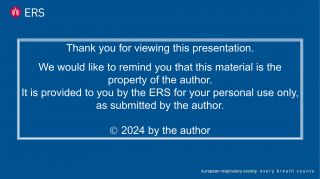14 October, 2024
18:00-19:00 CEST
Chair: Prof. James H. Hull (London, United Kingdom)
Speakers: Prof. Dr Vibeke Backer (Copenhagen, Denmark), Dr Neil Martin (Leicester (Leicestershire), United Kingdom), Prof. Dr
Morten Hostrup Nielsen (Copenhagen, Denmark)
Fees: Different fees for single/multiple sessions. Follow the links above.
Session 6: What is the best approach to treating asthma-related problems in athletes?
Learning objectives:
- To develop confidence in understanding the best way to approach treatment of athletic individuals with asthma.
- To become aware of anti-doping regulations in this area and thus build skills in discussing this with patients and to discuss areas such as therapeutic use exemptions (TUEs).
- To understand how the treatment of athletes with asthma fits within accepted guideline policy.
The respiratory system and sport: from bench to bedside, in an Olympic and Paralympic year webinar series
Participation in vigorous exercise or sport is now recognised to play an important role in many people's lifestyle. Sporting activity is associated with a broad range of benefits, including for pulmonary, cardiovascular, metabolic and mental health. For some individuals, however, the ability to participate in and enjoy sporting activity may be curtailed by the presence of respiratory symptoms. Indeed, it is estimated that at least one in four individuals report troublesome exercise-related respiratory issues and pulmonary conditions, such as asthma, are a highly prevalent and impactful problem in people partaking in endurance sport.
Despite respiratory issues being a prevalent issue in sport, clinicians often feel unclear as to the best way to proceed when faced with this problem. There is a lack of clear guidance regarding the best way to investigate pulmonary issues in athletic individuals and this can lead to uncertainty regarding the best way to proceed. There is also a need for pulmonary clinicians to consider how sporting activity interacts with environmental conditions and thus how to protect pulmonary health in the context of undertaking exercise, in potentially noxious environments. Pulmonary clinicians may also be faced with questions from individuals with chronic lung disease wishing to safely engage in and enjoy sport.
The aim of this webinar series, is to tackle these important areas, by presenting a series of six webinars, timed to coincide with the Olympic and Paralympic year in 2024, and to provide attendees with a 'state of the art' update in these areas. Leading experts in the field will be invited to contribute to this panel-style webinar series and the progamme has been designed to be inclusive and to appeal to a the broad ERS membership.
The series will enable attendees to become more confident in the assessment, diagnosis and management of respiratory problems in athletic individuals. The series will also provide a comprehensive overview of this area and thus appeal to a broad audience within the multidisciplinary team. The series starts with an overview of respiratory physiology in this area and the way diagnostic tests should be employed, before moving to discuss the key clinical issues.
Educational aims:
- Develop a detailed and broad understanding of how the pulmonary system responds to vigorous exercise and sport, in health and in disease.
- Understand how to assess the key causes of respiratory issues in athletic individuals and the main differential diagnoses.
- Become more confident in assessing individuals who present with symptoms and which tests to select to make a robust diagnosis.
- Develop expertise and confidence in discussing a broad range of topic areas, important to individuals participating in sport; including, how to consider whether to exercise in a potentially polluted environment, what to do about exercise and sporting participation if you have a chronic lung disease and what are the non-medicinal options to help breathing during sport.
- Improve knowledge in a broad range of therapeutic areas, including a consideration of how to apply asthma treatment guidelines to individuals partaking in sport.
Target audience:
The programme is designed to appeal to the entire ERS membership and includes:
- Adult and paediatric pulmonary physicians
- Physiologists
- Nurses
- Physiotherapists
- Speech and language therapists
- Researchers
- Epidemiologists
Learning outcomes:
Following this webinar, participants will be able to:
- Confidently assess and diagnose respiratory issues in athletic individuals.
- Select and interpret the best investigations to achieve a secure diagnosis of respiratory issues in athletic individuals.
- Advise patients wishing to discuss the place of sport in their lifestyle and to discuss risks and benefits clearly.
- Gain expertise in the use of inspiratory respiratory muscle training, in an athletic context.
- Understand how to best treat athletes with asthma-related issues.
Topics:
- Pulmonary physiology: Exercise physiology and whether the lung is underbuilt, overbuilt or just right for athletic endeavour. How do the airways function during vigorous exercise.
- Clinical assessment skills: What are the key causes of respiratory problems in athletic individuals. What are the key differential diagnoses and how can you use diagnostic tests in this situation.
- Environmental science / global health: How the environment interacts with pulmonary health - is pollution +/- climate change relevant and what can be done to protect pulmonary health of those participating in sport.
- Chronic disease management / symptom management: How to address and optimise opportunities from an increasing demand for people with chronic lung disease, to participate in sporting activity.
- Therapy based / physiotherapy treatment: What are the non-medicinal / therapy-based approaches that could be used to help people with breathing issues during sport.
- Asthma: How should clinicians approach the management of asthma in athletic individuals. Can standard asthma guidelines be applied and how does treatment of the athlete differ?
CME credits
An application will be submitted to EBAP (European Board for Accreditation in Pneumology) for CME accreditation of this event. The number of credits that you will receive will correspond to the time you spend viewing the sessions live.
Recordings
Video recordings of each session will be made available to registered participants within two weeks after each session.

